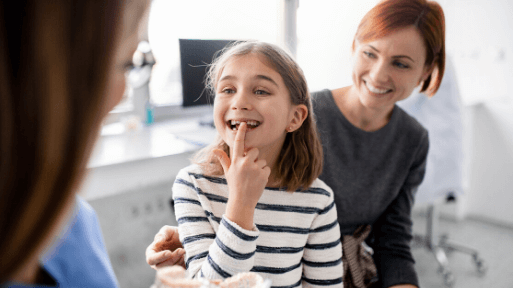 According to the American Dental Association and the American Academy of Pediatric Dentistry, your child’s first dental visit should be within six months of the first tooth appearing, but no later than age two. At these early appointments, your dentist can answer any questions you may have and give you information on a variety of topics, including infant feeding, teething, pacifier usage, finger-sucking habits, and early dental care.
According to the American Dental Association and the American Academy of Pediatric Dentistry, your child’s first dental visit should be within six months of the first tooth appearing, but no later than age two. At these early appointments, your dentist can answer any questions you may have and give you information on a variety of topics, including infant feeding, teething, pacifier usage, finger-sucking habits, and early dental care.
Even if you feel like your child is too young for the dentist, it’s important to know that the best way to ease fear and anxiety about the dentist is to get your child comfortable at an early age. Exposure builds trust and comfort. If it makes you feel more at ease, try bringing them along to one of your dentist appointments first and check out our tips on easing dental anxiety in children.
What to expect at your child’s first appointment
Your child’s first appointment will most likely be about introducing them to the dental office and staff members, as well as learning the basics about caring for their teeth. Typically, dentists will not do an actual exam on the first visit but they may take a quick look inside your child’s mouth to ensure all the teeth are coming in properly and to assess their bite. If possible or necessary, a quick cleaning may also be done.
Depending on your dentist and your child's comfort level, you may be asked to hold your child on your lap while the dentist takes a look in his or her mouth during the first appointment. After the first visit, you may be asked to stay outside the room so your toddler can gain a sense of confidence and comfort with the dental staff.
Don’t forget about the importance of early home dental care
Even before your child’s first scheduled dental appointment, the importance of home dental care cannot be stressed enough. Your child’s teeth should be brushed as soon as they emerge with a soft infant toothbrush and water about 2 to 3 times a day. Up until the age of 3, it’s recommended that you also use a smear of fluoridated toothpaste on the brush and then move on to a pea-sized amount after the age of 3. Remember to always supervise their brushing and spitting, too! Other tips for home dental care for your child include having them avoid falling asleep with a bottle and avoiding sugary beverages, both of which can cause an increase in cavity-causing bacteria.
Schedule an Appointment Today
Make an appointment with us today. We look forward to helping you and your child get a head start on healthy habits!

